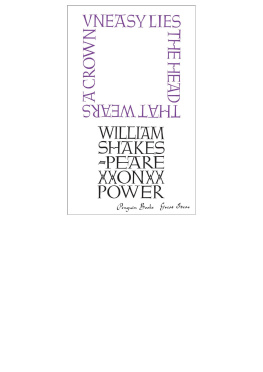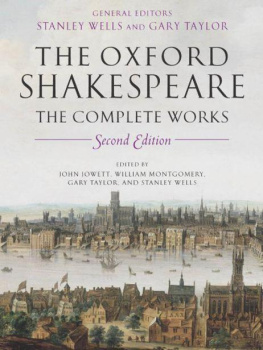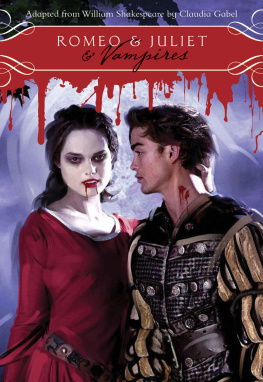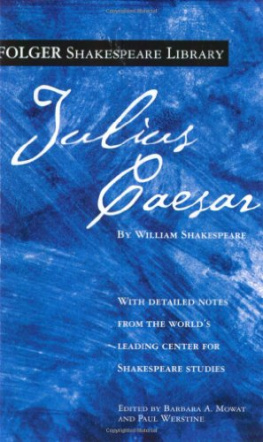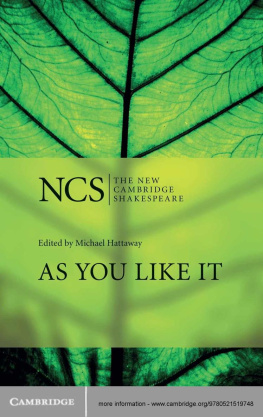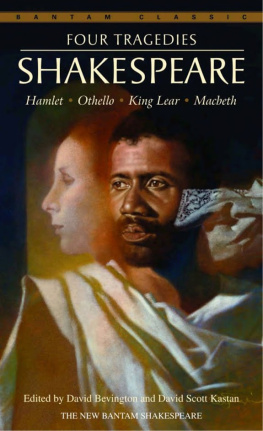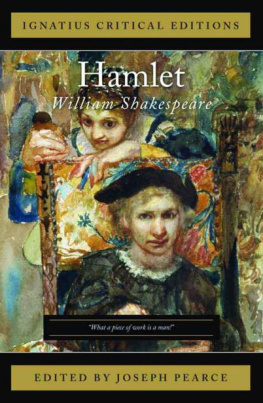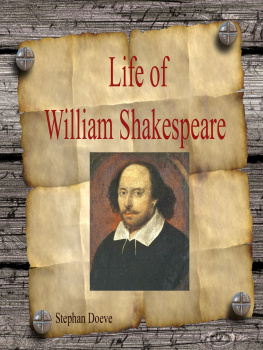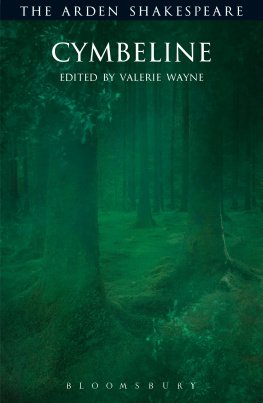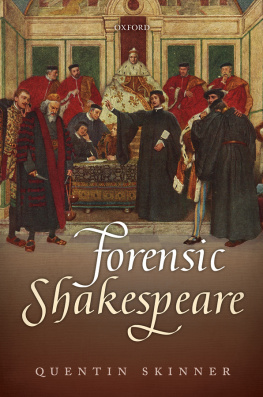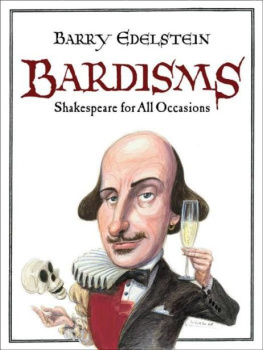William Shakespeare - On power
Here you can read online William Shakespeare - On power full text of the book (entire story) in english for free. Download pdf and epub, get meaning, cover and reviews about this ebook. year: 2009, publisher: Penguin, genre: Science. Description of the work, (preface) as well as reviews are available. Best literature library LitArk.com created for fans of good reading and offers a wide selection of genres:
Romance novel
Science fiction
Adventure
Detective
Science
History
Home and family
Prose
Art
Politics
Computer
Non-fiction
Religion
Business
Children
Humor
Choose a favorite category and find really read worthwhile books. Enjoy immersion in the world of imagination, feel the emotions of the characters or learn something new for yourself, make an fascinating discovery.
- Book:On power
- Author:
- Publisher:Penguin
- Genre:
- Year:2009
- Rating:3 / 5
- Favourites:Add to favourites
- Your mark:
- 60
- 1
- 2
- 3
- 4
- 5
On power: summary, description and annotation
We offer to read an annotation, description, summary or preface (depends on what the author of the book "On power" wrote himself). If you haven't found the necessary information about the book — write in the comments, we will try to find it.
On power — read online for free the complete book (whole text) full work
Below is the text of the book, divided by pages. System saving the place of the last page read, allows you to conveniently read the book "On power" online for free, without having to search again every time where you left off. Put a bookmark, and you can go to the page where you finished reading at any time.
Font size:
Interval:
Bookmark:
PENGUIN BOOKS GREAT IDEAS On Power William Shakespeare 15641616 William Shakespeare On Power PENGUIN BOOKS GREAT IDEAS PENGUIN BOOKS Published by the Penguin Group Penguin Books Ltd, 80 Strand, London WC2R 0RL , England Penguin Group (USA) Inc., 375 Hudson Street, New York, New York 10014, USA Penguin Group (Canada), 90 Eglinton Avenue East, Suite 700, Toronto, Ontario, Canada M4P 2Y3 (a division of Pearson Penguin Canada Inc.) Penguin Ireland, 25 St Stephens Green, Dublin 2, Ireland (a division of Penguin Books Ltd) Penguin Group (Australia), 250 Camberwell Road, Camberwell, Victoria 3124, Australia (a division of Pearson Australia Group Pty Ltd) Penguin Books India Pvt Ltd, 11 Community Centre, Panchsheel Park, New Delhi 110 017, India Penguin Group (NZ), 67 Apollo Drive, Rosedale, North Shore 0632, New Zealand (a division of Pearson New Zealand Ltd) Penguin Books (South Africa) (Pty) Ltd, 24 Sturdee Avenue, Rosebank, Johannesburg 2196, South Africa Penguin Books Ltd, Registered Offices: 80 Strand, London WC2R 0RL , England www.penguin.com This selection first published in Penguin Books 2009 All rights reserved Except in the United States of America, this book is sold subject to the condition that it shall not, by way of trade or otherwise, be lent, re-sold, hired out, or otherwise circulated without the publishers prior consent in any form of binding or cover other than that in which it is published and without a similar condition including this condition being imposed on the subsequent purchaser ISBN: 978-0-14-195660-2 ContentsPower in governmentHamlet, Act III, Scene 3 ROSENCRANTZ : The single and peculiar life is bound With all the strength and armour of the mind To keep itself from noyance, but much more That spirit upon whose weal depends and rests The lives of many. The cease of majesty Dies not alone, but like a gulf doth draw Whats near it with it. It is a massy wheel Fixed on the summit of the highest mount, To whose huge spokes ten thousand lesser things Are mortised and adjoined, which when it falls Each small annexment, petty consequence, Attends the boistrous ruin. Never alone Did the King sigh, but with a general groan. Richard II, Act III, Scene 2 KING RICHARD : Of comfort no man speak. Lets talk of graves, of worms, and epitaphs, Make dust our paper and with rainy eyes Write sorrow on the bosom of the earth.
Lets choose executors and talk of wills, And yet not so, for what can we bequeath Save our deposed bodies to the ground? Our lands, our lives, and all are Bolingbrokes, And nothing can we call our own but death, And that small model of the barren earth Which serves as paste and cover to our bones. For Gods sake, let us sit upon the ground And tell sad stories of the death of kings: How some have been deposed, some slain in war, Some haunted by the ghosts they have deposed, Some poisoned by their wives, some sleeping killed, All murdered. For within the hollow crown That rounds the mortal temples of a king Keeps Death his court; and there the antic sits, Scoffing his state and grinning at his pomp, Allowing him a breath, a little scene, To monarchize, be feared, and kill with looks, Infusing him with self and vain conceit, As if this flesh which walls about our life Were brass impregnable; and humoured thus, Comes at the last, and with a little pin Bores through his castle wall; and farewell, king. Cover your heads and mock not flesh and blood With solemn reverence. Throw away respect, Tradition, form, and ceremonious duty, For you have but mistook me all this while. I live with bread, like you; feel want, Taste grief, need friends.
Subjected thus, How can you say to me I am a king? Timon of Athens, Act IV, Scene 3
TIMON : Not by his breath that is more miserable. Thou art a slave whom fortunes tender arm With favour never clasped, but bred a dog. Hadst thou like us from our first swathe proceeded The sweet degrees that this brief world affords To such as may the passive drudges of it Freely command, thou wouldst have plunged thyself In general riot, melted down thy youth In different beds of lust, and never learned The icy precepts of respect, but followed The sugared game before thee. But myself, Who had the world as my confectionary, The mouths, the tongues, the eyes and hearts of men At duty, more than I could frame employment, That numberless upon me stuck, as leaves Do on the oak, have with one winters brush Fell from their boughs, and left me open, bare For every storm that blows. I to bare this, That never knew but better, is some burden. Thy nature did commence in sufferance, time Hath made thee hard int.
Why shouldst thou hate men? They never flattered thee. What hast thou given? If thou wilt curse, thy father, that poor rag, Must be thy subject, who in spite put stuff To some she-beggar and compounded thee Poor rogue hereditary. Hence, be gone. If thou hadst not been born the worst of men Thou hadst been a knave and flatterer.
For so work the honey-bees, Creatures that by a rule in nature teach The act of order to a peopled kingdom. They have a king, and officers of sorts, Where some like magistrates correct at home; Others like merchants venture trade abroad; Others like soldiers, armed in their stings, Make boot upon the summers velvet buds, Which pillage they with merry march bring home To the tent royal of their emperor, Who busied in his majesty surveys The singing masons building roofs of gold, The civil citizens lading up the honey, The poor mechanic porters crowding in Their heavy burdens at his narrow gate, The sad-eyed justice with his surly hum Delivering oer to executors pale The lazy yawning drone. I this infer: That many things, having full reference To one consent, may work contrariously. As many arrows, loosed several ways, Fly to one mark, as many ways meet in one town, As many fresh streams meet in one salt sea, As many lines close in the dials centre, So may a thousand actions once afoot End in one purpose, and be all well borne Without defect. Therefore to France my liege. Divide your happy England into four, Whereof take you one quarter into France, And you withal shall make all Gallia shake.
If we with thrice such powers left at home Cannot defend our own doors from the dog, Let us be worried, and our nation lose The name of hardiness and policy. Coriolanus, Act II, Scene 2
Font size:
Interval:
Bookmark:
Similar books «On power»
Look at similar books to On power. We have selected literature similar in name and meaning in the hope of providing readers with more options to find new, interesting, not yet read works.
Discussion, reviews of the book On power and just readers' own opinions. Leave your comments, write what you think about the work, its meaning or the main characters. Specify what exactly you liked and what you didn't like, and why you think so.

